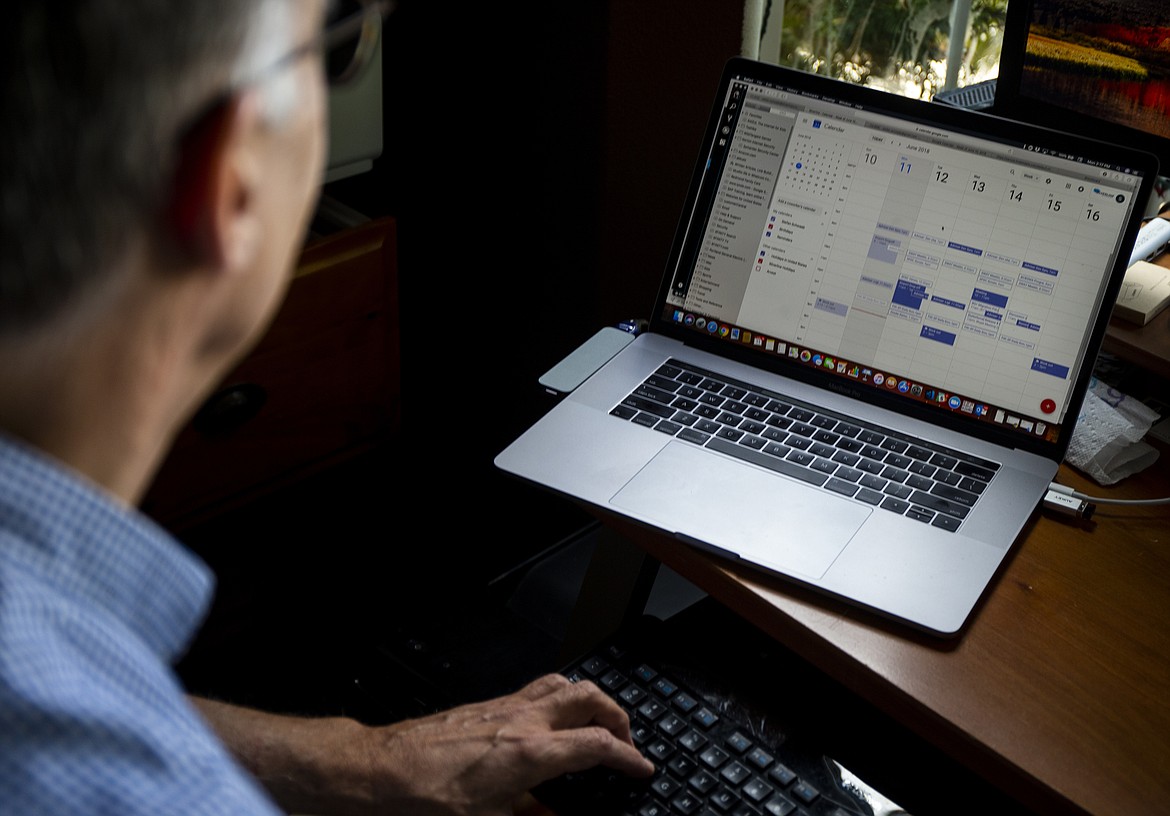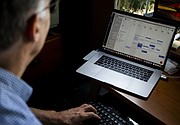To this remote worker, life is simply better
Stefan Schwaab’s commute takes seconds, and his MPG is pretty good. In fact, it’s infinite.
His co-workers don’t fight like cats and dogs; they are cats and dogs.
Schwaab, 58, works from an office in his spacious Hayden home.
Statistically, Schwaab is one of the 5.9 percent of Idahoans who earn their living remotely.
Personally, he wouldn’t have it any other way. Asked what’s the very best thing about working from home, he said: “I can participate in a real way in my family life, in my kids’ lives.”
But that doesn’t mean the employment dream has always been free of rude wake-up calls.
Schwaab earned his bachelor’s degree in mechanical engineering from prestigious Northwestern University in the Chicago suburb of Evanston. After about five years of engineering work, he said, “I kind of fell in love with computers. I found that I had a knack for working with them.” Being a bright guy, he also found that there’s great demand for people with a knack for working with computers.
For the past 21 years — minus a short gap during the recession when he had to hit the road to Detroit and northern California to make ends meet — Schwaab has been a computer-consulting homebody. He broke free after commuting from his home in Dublin, Calif., to Oakland every day all those years ago. And he looks back only when somebody asks him to.
“I remember the day I left that position to go out on my own. I remember it vividly,” he told NIBJ. “I remember driving home and realizing, with a certain amount of elation, that I would not have to make that commute anymore, I would not have to struggle with the traffic, I would not have to go into that office anymore. I would not be shackled to that desk and that chair and feel like I needed to be there for hours every day. It was almost like a prison sentence to me.
“I realized that I would not be happy in an office situation long-term. I needed to strike out on my own. That to me completely overwhelmed the inherent risks.”
It took awhile for Schwaab to replace — and eventually exceed — his corporate-delivered income, and he admitted that the break “was definitely scary. But I was just so much happier in my daily lifestyle. It just seemed to make sense going with it.”
Staying with it has been easy, thanks in no small measure to the Schwaabs’ prioritizing family life. They home-schooled their four children through elementary and into their middle school years.
“There’s no way I could have participated in that process if I had to go into an office all the time,” he said.
Working for himself with major clients that include SalesForce.com — which, coincidentally, ranked No. 1 on Fortune’s “100 Best Companies to Work For” in 2018 — Schwaab is on the phone pretty much from 7 a.m. to noon or 1 p.m. daily. That’s because he’s working with clients based mostly on the East Coast.
“I get up early but my afternoons are my own,” he said. “To me, it’s a much more balanced lifestyle.”
As good as it is, this remote work thing isn’t perfect.
Schwaab acknowledges that working from home “can cause strife in the family.” If there’s a leaky faucet or the toilet won’t flush, for instance, his wife might ask for help.
“If I were at an office, she would call somebody to come in or wait until I got home,” he said. “But since I’m home, it’s like free time to get me involved in household chores, which I can’t focus on when I need to be focused on my work. That can cause a certain amount of tension.”
And then there are the kids. When the Schwaabs’ son Evan was 2, he wanted what every small child wants.
Attention.
Schwaab recalled one day in particular when Evan climbed up into his dad’s chair, scaled his arm and managed to make it all the way to his dad’s shoulder while Stefan was on the phone working through a situation with a client.
“I finished my phone call and realized he was sound asleep on my shoulder,” Schwaab said. “He had spent all his excess energy trying to get my attention.”
But plumbing problems and attention-seeking children are, to Schwaab, “minor inconveniences. The biggest one about working from home is that, unequivocally, you’re always working. You’re never not working. There’s no strong dividing line between the office and home.”
Another downside for some workers is a plus for Schwaab: He neither needs nor wants a supervisor looking over his shoulder, providing motivation and ensuring work is being done.
“I actually have the opposite problem,” he said. “When someone’s looking over my shoulder it makes me anxious. I’m less productive. When I’m self-directed, I can be much more productive.”
Schwaab knows he might have been just as successful working within a traditional corporate employer-employee structure, at least financially and career-wise, but it simply would not have been the same.
“I’ve never regretted it,” he said, “because my lifestyle has been so much more fulfilling and so much more something that just suits my personality.”



